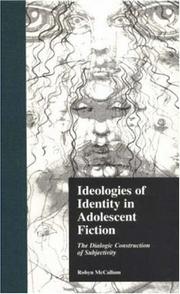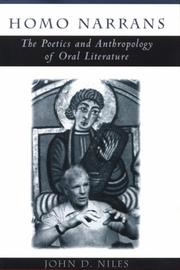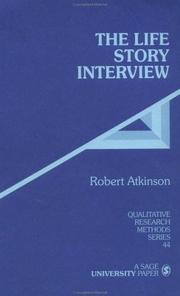| Listing 1 - 6 of 6 |
Sort by
|

ISBN: 0313301921 Year: 1999 Publisher: Westport (Conn.) : Greenwood press,
Abstract | Keywords | Export | Availability | Bookmark
 Loading...
Loading...Choose an application
- Reference Manager
- EndNote
- RefWorks (Direct export to RefWorks)
Children's stories, American --- Science fiction, American --- Bibliography. --- Bibliography.

ISBN: 9027216355 1556197896 9786612163876 1282163876 9027299757 9789027299758 9781556197895 9789027216359 Year: 1999 Volume: 30 Publisher: Amsterdam/Philadelphia : John Benjamins Publishing Company,
Abstract | Keywords | Export | Availability | Bookmark
 Loading...
Loading...Choose an application
- Reference Manager
- EndNote
- RefWorks (Direct export to RefWorks)
Dealing with the most translated work of German literature, the Tales of the brothers Grimm (1812-1815), this book discusses their history, notably in relation to Denmark and subsequently other nations from 1816 to 1986. The Danish intelligentsia responded enthusiastically to the tales and some were immediately translated into Danish by a nobleman and by the foremost Romantic poet. Their renditions remained in print for a century and embued the tales with high prestige. This book discusses translators, approaches, and other parameters such as copyright, and changes in target audiences.
#KVHA:Vertaalgeschiedenis --- Theory of literary translation --- Grimm [Brothers] --- Folk literature, German --- Children's stories, German --- Fairy tales --- German language --- Translations into Danish --- History and criticism --- Translating into Danish --- Kinder- und Hausmärchen --- Translations --- History and criticism. --- Translating into Danish. --- Children's stories, German -- Translations into Danish -- History and criticism. --- Fairy tales -- Germany -- History and criticism. --- Folk literature, German -- History and criticism. --- Folk literature, German -- Translations into Danish -- History and criticism. --- German language -- Translating into Danish. --- Kinder and Hausmarchen -- Translations -- History and criticism. --- Folklore --- Anthropology --- Social Sciences --- Ashkenazic German language --- Hochdeutsch --- Judaeo-German language (German) --- Judendeutsch language --- Judeo-German language (German) --- Jüdisch-Deutsch language --- Jüdischdeutsch language --- Germanic languages --- German children's stories --- German fiction --- German folk literature --- German literature --- Folk literature, German - Translations into Danish - History and criticism --- Children's stories, German - Translations into Danish - History and criticism --- Fairy tales - Germany - History and criticism --- Folk literature, German - History and criticism --- German language - Translating into Danish

ISBN: 1282778943 9786612778940 1135581304 0203900952 9780203900956 9780815322900 0815322909 9781135581305 9781135581251 1135581258 9781135581299 1135581290 9780415858021 041585802X 0815322909 Year: 1999 Publisher: New York : Garland Pub.,
Abstract | Keywords | Export | Availability | Bookmark
 Loading...
Loading...Choose an application
- Reference Manager
- EndNote
- RefWorks (Direct export to RefWorks)
Ideologies of Identity in Adolescent Fiction examines the representation of selfhood in adolescent and children's fiction, using a Bakhtinian approach to subjectivity, language, and narrative. The ideological frames within which identities are formed are inextricably bound up with ideas about subjectivity, ideas which pervade and underpin adolescent fictions. Although the humanist subject has been systematically interrogated by recent philosophy and criticism, the question which lies at the heart of fiction for young people is not whether a coherent self exists but what kind of self i
Young adult fiction --- Children's stories --- Subjectivity in literature. --- Self in literature. --- Identity (Psychology) in literature. --- Social interaction in literature. --- Fiction --- Narration (Rhetoric) --- Narrative (Rhetoric) --- Narrative writing --- Rhetoric --- Discourse analysis, Narrative --- Narratees (Rhetoric) --- Fiction writing --- Metafiction --- Writing, Fiction --- Authorship --- Young adult literature --- History and criticism. --- Technique. --- Children --- Narration (Rhetoric). --- Youth --- Books and reading. --- børne- og ungdomslitteratur.
Book
ISBN: 1283889994 0812202953 0812221079 9780812221077 Year: 1999 Publisher: Philadelphia : University of Pennsylvania Press,
Abstract | Keywords | Export | Availability | Bookmark
 Loading...
Loading...Choose an application
- Reference Manager
- EndNote
- RefWorks (Direct export to RefWorks)
It would be difficult to imagine what human life would be like without stories—from myths recited by Pueblo Indian healers in the kiva, ballads sung in Slovenian market squares, folktales and legends told by the fireside in Italy, to jokes told at a dinner table in Des Moines—for it is chiefly through storytelling that people possess a past.In Homo Narrans John D. Niles explores how human beings shape their world through the stories they tell. The book vividly weaves together the study of Anglo-Saxon literature and culture with the author's own engagements in the field with some of the greatest twentieth-century singers and storytellers in the Scottish tradition. Niles ponders the nature of the storytelling impulse, the social function of narrative, and the role of individual talent in oral tradition. His investigation of the poetics of oral narrative encompasses literary works, such as the epic poems and hymns of early Greece and the Anglo-Saxon Beowulf, texts that we know only through written versions but that are grounded in oral technique.That all forms of narrative, even the most sophisticated genres of contemporary fiction, have their ultimate origin in storytelling is a point that scarcely needs to be argued. Niles's claims here are more ambitious: that oral narrative is and has long been the chief basis of culture itself, that the need to tell stories is what distinguishes humans from all other living creatures.
Folk literature. --- Oral tradition. --- Storytelling. --- Story-telling --- Telling of stories --- Oral interpretation --- Children's stories --- Folklore --- Oral interpretation of fiction --- Tradition, Oral --- Oral communication --- Oral history --- Oral literature --- Literature --- Performance --- Littérature orale --- Ballads, English - England - History and criticism. --- Poésie anglaise --- Écosse --- Ballads, English

ISBN: 0812235045 Year: 1999 Publisher: Philadelphia University of Pennsylvania Press
Abstract | Keywords | Export | Availability | Bookmark
 Loading...
Loading...Choose an application
- Reference Manager
- EndNote
- RefWorks (Direct export to RefWorks)
Art de conter --- Art de dire les contes --- Art de raconter des histoires --- Art du conte --- Art du conteur --- Contes -- Art de dire --- Contes folkloriques --- Contes populaires --- Conteurs -- Art de dire --- Culture orale --- Folk literature --- Folk-tales --- Litterature orale --- Litterature primitive --- Littérature populaire --- Mondelinge literatuur --- Mondelinge overlevering --- Mondelinge traditie --- Oral literature --- Oral tradition --- Orale [Tradition ] --- Orale cultuur --- Oralité (Tradition) --- Primitieve literatuur --- Primitive literature --- Story-telling --- Storytelling --- Telling of stories --- Tradition [Oral ] --- Tradition orale --- Vertelkunst --- Volksliteratuur --- Volksverhalen --- Oral interpretation --- Children's stories --- Folklore --- Oral interpretation of fiction --- Tradition, Oral --- Oral communication --- Oral history --- Literature --- Performance --- Folk literature. --- Oral tradition. --- Storytelling.

ISBN: 076190428X 0761904271 1412986206 1452209642 Year: 1999 Volume: v. 44 Publisher: Thousand Oaks (Calif.) : Sage,
Abstract | Keywords | Export | Availability | Bookmark
 Loading...
Loading...Choose an application
- Reference Manager
- EndNote
- RefWorks (Direct export to RefWorks)
Autobiography. --- First person narrative. --- Storytelling. --- Art de conter --- Autobiographie --- Récits à la première personne --- #SBIB:303H10 --- #VCV monografie 2004 --- Methoden en technieken: algemene handboeken en reeksen --- Récits à la première personne --- Qualitative methods in social research --- Social sciences --- Sciences sociales --- Methodology --- Méthodologie --- Autobiography --- First person narrative --- Storytelling --- #SBIB:001.AANKOOP --- Story-telling --- Telling of stories --- Oral interpretation --- Children's stories --- Folklore --- Oral interpretation of fiction --- Narrative, First person --- Fiction --- Literature --- Narration (Rhetoric) --- Point of view (Literature) --- Persona (Literature) --- Autobiographies --- Egodocuments --- Memoirs --- Biography as a literary form --- Performance --- Technique --- History and criticism
| Listing 1 - 6 of 6 |
Sort by
|

 Search
Search Feedback
Feedback About
About Help
Help News
News